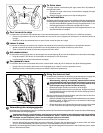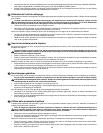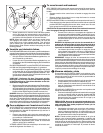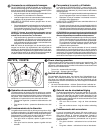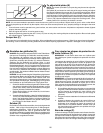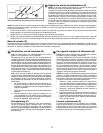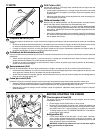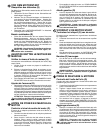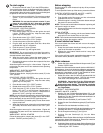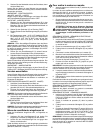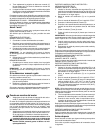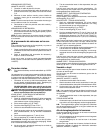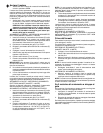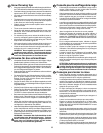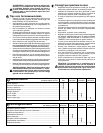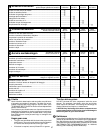
30
To start engine
• Be sure fuel shut-off valve (F) is in the OPEN position.
Your snow thrower engine is equipped with both a 220 Volt
A.C. electric starter and a recoil starter. The electric starter is
equipped with a three-wire power cord and plug and is designed
to operate on 220 Volt A.C. household current.
• Be sure your house is a 220 Volt A.C. three-wire ground ed
system. If you are uncertain, consult a licensed elec-
tri cian.
WARNING: Do not use the electric starter if your
house is not a 220 Volt A.C. three-wire grounded
system. Serious personal injury or damage to your
snow thrower could result.
COLD START - ELECTRIC STARTER
(8024STE, 9027STE, 1130STE)
1. Insert safety ignition key (D) into the ignition slot until
it clicks. DO NOT turn the key. Keep the extra safety
ignition key in a safe place.
2. Place throttle control (C) in “FAST” position.
3. Rotate choke control (E) to “FULL” position.
4. Connect the power cord to the engine (S).
5. Plug the other end of the power cord into a three-hole
grounded 220 Volt A.C. receptacle.
6. Push the primer (T) three (3) times.
7. Push starter button (U) until engine starts.
IMPORTANT: Do not crank engine more than fi ve continu-
ous seconds between each time you try to start. Wait 5 to 10
seconds between each attempt.
8. When the engine starts, release the starter button and
slowly move the choke control to the “OFF” position.
9. Disconnect the power cord from the receptacle fi rst, then
from the engine.
Allow the engine to warm up for a few minutes. Engine will
not develop full power until it has reached normal operating
temperature.
WARM START - ELECTRIC STARTER
(8024STE, 9027STE, 1130STE)
Follow the steps above, keeping the choke control (E) in the
“OFF” position.
COLD START - RECOIL STARTER
1. Insert safety ignition key (D) into the ignition slot until
it clicks. DO NOT turn the key. Keep the extra safety
ignition key in a safe place.
2. Place throttle control (C) in “FAST” position.
3. Rotate choke control (E) to “FULL” position.
4. Push the primer (T) four (4) times if the temperature is
below –10°C (15°F), or two (2) times if temperature is
between –10°C & 10°C (15°F & 50°F). If temperature is
above 10°C (50°F), priming is not necessary.
NOTE: Over priming may cause fl ooding, preventing the engine
from starting. If you do fl ood the engine, wait a few minutes
before attempting to start and DO NOT push the primer.
5. Pull recoil starter (V) handle quickly. Do not allow starter
rope to snap back.
6. When the engine starts, release the recoil starter handle
and slowly move the choke control to the “OFF” posi-
tion.
Allow the engine to warm up for a few minutes. Engine will
not develop full power until it has reached normal operating
temperature.
WARM START - RECOIL STARTER
Follow the steps above, keeping the choke (E) in the “OFF”
position. DO NOT push the primer (T).
Before stopping
Run the engine for a few minutes to help dry off any moisture
on the engine.
To avoid possible freeze-up of the starter, proceed as follows:
ELECTRIC STARTER (8024STE, 9027STE, 1130STE)
1. Connect the power cord to the engine.
2. Plug the other end of the power cord into a three-hole
grounded 220 Volt A.C. receptacle.
3. While the engine is running, push starter button and spin
the starter for several seconds.
NOTE: The unusual sound made while starter is spinning will
not harm the engine or starter.
4. Disconnect the power cord from the receptacle fi rst, then
from the engine.
RECOIL STARTER
1. While the engine is running, pull the recoil starter handle
with rapid, full arm strokes three or four times.
NOTE: The unusual sound made while pulling the recoil starter
handle will not harm the engine or starter.
If recoil starter has frozen
If the recoil starter has frozen and will not turn the engine,
proceed as follows:
1. Grasp the recoil starter handle and slowly pull as much
rope out of the starter as possible.
2. Release the recoil starter handle and let it snap back
against the starter.
If the engine still fails to start, repeat the above steps or use
the electric starter (8024STE, 9027STE, 1130STE).
Motor anlassen
• Stellen Sie sicher, dass das Benzin-Absperrventil (F) auf
Position “OPEN” steht.
Der Motor Ihrer Schneefräse ist sowohl mit einem 220Volt A.C.
Elektrostarter, als auch mit einem Anreißstarter ausgestattet.
Der Elektrostarter ist mit einem dreidrahtigen Netzkabel und
Netzstecker ausgestattet, und ist für den Betrieb bei einem
Haushaltsstrom von 220 Volt A.C. geeignet.
• Stellen Sie sicher, dass Ihr Haus ein geerdetes 220 Volt
A.C. Sicherheitssystem besitzt. Falls Sie sich dessen
nicht sicher sind, befragen Sie einen Elektriker.
WARNUNG: Verwenden Sie den Elektrostarter
nicht, falls Ihr Haus kein geerdetes 220 Volt A.C.
Sicherheitssystem besitzt. Dies könnte ernsthafte
Verletzungen oder Schäden an Ihrer Schneefräse
zur Folge haben.
KALTSTART - ELEKTROSTARTER
(8024STE, 9027STE, 1130STE)
1. Stecken Sie den Sicherheitszündschlüssel (D) in das
Zündschloss, bis es klickt. Schlüssel NICHT umdrehen.
Bewahren Sie den Ersatzsicherheitszündschlüssel an
einem sicheren Ort auf.
2. Stellen Sie den Gashebel (C) auf Position “FAST”.
3. Drehen Sie den Choke-Bedienungsknopf (E) auf Po si tion
“FULL”.
4. Schließen Sie das Netzkabel am Motor an (S).
5. Schließen Sie das andere Ende des Netzkabels an eine
geerdete 220 Volt A.C. Schutzkontaktsteckdose an.
6. Sie die Einspritzvorrichtung (T) drei (3) mal.
7. Drücken Sie den Startknopf (U), bis der Motor
anspringt.
WICHTIG: Kurbeln Sie den Motor nie länger als fünf Sekunden
lang zwischen jedem Startversuch an. Warten Sie zwischen
den Startversuchen 5 bis 10 Sekunden.
8. Sobald der Motor anspringt, lassen Sie den Startknopf los
und bewegen Sie den Choke-Bedienungsknopf langsam
in Richtung der “OFF” Position.



